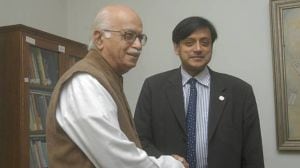The first lady of shipping
India is the inheritor of a glorious maritime tradition harking back to the pre-Christian era. Unfortunately Indian shipping suffered a s...

India is the inheritor of a glorious maritime tradition harking back to the pre-Christian era. Unfortunately Indian shipping suffered a serious setback in the nineteenth century due to stiff opposition from British interests. The attempts at its revival on modern lines began after the first world war and gathered momentum during the freedom struggle.
However, it was only after independence that the role of shipping as an important component in the economic life of the nation was recognised. A leading part in resuscitating the shipping industry was played by an illustrious woman named Sumati Morarjee.
She was born in 1909, being the only daughter of the textile magnate Mathuradas Goculdas of Mumbai. She had no formal education and was educated at home. When she was 13, she was given in marriage to Shanti Kumar, the only son of the pioneering merchant prince Naro-ttam Morarjee. It was Narottam who had founded the Scindia Steam Navigation Company in 1919 and ushered in the dawn of modern Indian shipping. He nominated Sumati as a member of the managing agency of the firm. After his death in 1929, the work of the company occupied her active attention.
In 1957 the management of the Scindias was taken over by a committee of three Directors which included Sumati. She rose to be the Executive Director and chief of the organisation. Earlier, in 1956, she was elected President of the Indian National Steamship Owners’ Association. She had thus the distinction of being the first woman to be the head of a national shipowners’ body and a national shipping company. She was at the helm of affairs of both for several years.
Thanks to her tireless efforts, the tonnage of the Scindias rose from 1,68,762 tonnes in 1949 to 4,00,000 tonnes in 1962 and it became the biggest shipping company in the private sector in India. She regarded herself as the first servant’ of the Scindias and, in the words of J.R.D. Tata, she “set a fine example of enlightened management and leadership.”
She was also vice-chairman of the Maritime Law Association of India, Deputy chairman of Lloyd’s India Committee and a member of the National Shipping Board and the Merchant Navy Training Board. Since her younger days she won the affection of Mahatma Gandhi. He was a guest in her house near Juhu in 1924 and 1944. When she took charge as Director of administration of Scindias in 1946, Gandhiji wrote to her: “Nice that you have accepted the responsibilities. I am immensely glad. Never get worried. I am always with you.”
A patriot to the core, Sumati supported the underground activities following the Quit India movement in 1942 and gave shelter to eminent leaders like Jayaprakash Narayan, Aruna Asaf Ali and Achyut Patwardhan.
She often said that her interest in shipping was not actuated by business motives alone. She firmly believed that a strong mercantile marine was essential for the growth of industry and the defence of the country.
According to her, the main problems of Indian shipping were expansion of tonnage, greater participation of Indian tonnage in our overseas trade, a consistent policy by government to channelise their shipments by Indian ships and the development of ports. She carried on a crusade for the achievement of these goals and championed the cause of Indian shipping in international conferences over the years.
Jayapraksh Narayan had aptly observed that Sumati’s life was a remarkable one, “made more remarkable by the fact that it is the life of a woman who has distinguished herself in such an exclusively male profession as shipping.” This first lady of Indian, nay world, shipping passed away on June 28, 1998, largely unwept, unhonoured and unsung. When shall we see such another?



- 01
- 02
- 03
- 04
- 05




























